- Home
- Jim Eldridge
Codename Céline
Codename Céline Read online
While this book is based on real characters and actual historical events, some situations and people are fictional, created by the author.
Contents
Cover
Chapter 1
Chapter 2
Chapter 3
Chapter 4
Chapter 5
Chapter 6
Chapter 7
Chapter 8
Chapter 9
Chapter 10
Chapter 11
Chapter 12
Chapter 13
Chapter 14
Chapter 15
Chapter 16
Chapter 17
Chapter 18
Chapter 19
Chapter 20
Chapter 21
Chapter 22
Chapter 23
Epilogue
Historical Note
Copyright
Chapter 1
BOOOOOMM!!!!
The bomb blast was two streets away, but it shook the pavement beneath our feet as my Aunt Abbey and I stumbled through the entrance of Mornington Crescent Underground Station.
“That nearly got us,” I said as we made our way down the circular staircase, holding onto the handrail in case another explosion came. There had been nights when we’d been deep below ground here, when even the tube platform seemed to shake if a bomb was particularly close.
I’m Violet Debuchy – French name from a French father but an English mother – 17 years old, and right now doing my best to keep me and my aunt alive during the latest German bombing attack.
“I’m sure they’ve started bombing earlier tonight,” said Aunt Abbey. “Or maybe the siren didn’t go off properly.”
“It went off, but you were hanging around looking for your ration book,” I reminded her.
“It doesn’t do to leave your ration book lying around in your house,” retorted Aunt Abbey, following me down the winding stairs. “What if there’d been looters and the house had got blown up and they’d gone in and taken it?”
I was on the point of snapping back that if our house was bombed, a missing ration book would be the least of our worries, but I bit my lip to stop myself saying anything. Aunt Abbey may have her irritating ways, but then so have I. And Aunt Abbey had taken me and my parents in and given us a roof over our heads when we needed it.
We reached the station platform, which was already full. Some families had turned their particular spaces into underground homes: mattresses, chairs – with some using small paraffin stoves to boil a kettle to make a pot of tea. Other people had even built bunk beds for their children to sleep on.
“Hello, Mrs Hicks!” called our neighbour, Dolly Mason. “I’ve kept you and Violet a space!”
And she had, laying cushions out next to her patch of platform.
We sat down on the cushions.
“I’m sure the bombing’s started earlier tonight,” said Dolly Mason.
“That’s what I said to Violet,” nodded Aunt Abbey, and she and Dolly proceeded to engage in one of their regular conversations in the deep-underground air-raid shelter, while I did my best to let the situation wash over me. It’d be best if I could sleep, that’s what Aunt Abbey always said to me. But how could I sleep with bombs raining down around us, the tube station, the walls, the ground shaking with every new explosion, and the threat of everything coming down on top of us?
It was January 1944 and the War had been going on for four and a half years, since September 1939. That was the year when I – then 13 years old – had been brought to England from France by my dad and mum. Sometimes, when I close my eyes, I can still see my dad, Jacques Debuchy, coming home from work to our apartment in Paris and telling me and Mum: “The Germans are going to invade. Nowhere in France will be safe. Nor Belgium, or Holland. The Germans will sweep across border after border, just as they did in 1914. We have to leave.”
And so we came to London, where my mother, Mary, had an older sister, Abbey. Abbey was a widow, and was delighted to `welcome us into her home. “This house is too big for me since Henry died,” she said. “It will be wonderful to have you staying here. You can stay as long as you like.”
“There’s a war coming,” Dad had said. “We could be here for a long time.”
“Everyone’s saying if there is a war, it’ll be all over by Christmas,” said Aunt Abbey. “No one will want to go through again what we went through before. It’s only twenty years since the last war ended!”
But within a month of us arriving in London, war had come.
At the start of the war, most of London’s schoolchildren had been evacuated to the countryside, in expectation of air raids. I didn’t go with the rest of the children because I’d only recently arrived in England, so I wasn’t attached to any school. But after a month or so, when there had still been no signs of any air attacks on London, most children returned to the capital.
London’s schools re-opened, and I was sent to the French Lycée, where most French families living in London sent their children, and where lessons were carried out in both French and English.
Despite growing up in France, English wasn’t a problem for me. I’d spent a lot of time in England as a child, staying with Mum’s family: her parents, Grampa and Granma; my Aunt Abbey and her husband; and Mum’s handsome and funny younger brother, Eric. Lovely, wonderful Uncle Eric.
During the first months of the war, life had gone on much as normal. Like everyone else, I carried a gas mask with me wherever I went in case of an air attack by gas bombs. And at night all the streetlights were left unlit and heavy dark blackout curtains were pulled across windows to stop any light escaping that could help guide German bomber pilots to their targets: the cities. But then, in 1940, everything fell apart.
Uncle Eric, so dashing and great, was killed at Dunkirk, where half a million British and French soldiers had been forced back to the French coast by the Germans. Over 300,000 of them were rescued from the beaches at Dunkirk by the Navy, but thousands died or were taken prisoner. Uncle Eric was one of those killed.
Granma died soon afterwards, some said of a broken heart at the loss of her beloved son. And Grampa, aged 60, died soon after that of a heart attack.
Then, worst of all, in September 1940 came the Blitz – a series of air attacks night after night when the German Luftwaffe rained bombs down on London. Buildings were smashed to bits and the casualty rates rose rapidly. Thousands died. Among them was my mum. I can still hardly bear to think about it.
Mum had decided to stay the night with an invalid aunt of hers, Aunt Peggy, who was seriously ill. Aunt Peggy’s house took a direct hit. Aunt Peggy, her family, and Mum were all killed.
Dad was in France when Mum was killed. In May 1940, soon after the Germans invaded France, he’d gone to join the French Resistance. He came back to England for Mum’s funeral, but left soon afterwards, going back to France to carry on the battle. It was as if Mum’s death had robbed him of all feelings except revenge.
He’d hugged me closely to him the last time I’d seen him, before he’d returned to France, and whispered fiercely to me: “I shall pay them back for what they’ve done, ma petite!”
Since that day, in 1940, I hadn’t heard a word from him. Almost four years! I knew it would be difficult for him to get a message out, but it was still hard not knowing if he was alive or dead.
I carried on with my life – living with Aunt Abbey, going to school at the Lycée – until I turned sixteen in 1942. Then I left school to go to work, as most others did.
My first aim had been to join either the Women’s Royal Army Corps (the WRACS) or the Women’s Royal Naval Service (the Wrens), but
I was told at the recruiting office that I was too young. “Eighteen, dear,” the woman had told me. “Then you can apply.”
And so I’d looked for something else I could do that would help the war effort. I thought of nursing, helping the wounded, but I was told that I’d have to do two years’ training. Two years! The War could be over by then!
The thing was that I wanted to be in action, which is why I’d tried to get into the WRACS or the Wrens. But then I found out that women in those services didn’t actually see any action: their roles were restricted to cooks or messengers. I wanted to do something to pay the Germans back for killing my mum and Uncle Eric!
The Labour Exchange offered me a job in a munitions factory. “You’ll be making bombs. That’ll help the war effort.” But there were problems with my papers. I was a French citizen, an alien. And the Government were rounding up foreign aliens.
“But my father’s fighting the Germans in France!” I protested. “My mother and her family are English, and my mother was killed by the Germans! I live here! I’m English on my mother’s side!”
“But you’re French according to your birth certificate,” said the woman at the Labour Exchange. “You were born
in France.”
And so I’d ended up working in a series of shops while I waited for my eighteenth birthday to come around. Then I’d be able to apply for the WRACS or the Wrens again. Even being a messenger would be doing something. I’d be in uniform and helping the fight.
I thought of trying to get into the WAAF, the Women’s Auxiliary Air Force, working in the control rooms. I might even get to fly a plane! I knew there were women flying Spitfires, and even Lancasters, moving them from airfield to airfield. But, as with the other services, I was told I was too young.
So right now I’m a 17-year-old, living with my aunt, working in a clothes shop by day and spending most of my nights in the air-raid shelter deep underground, like now, and desperately wondering where Dad is, and what he’s doing. Does he ever think of me? Does he miss me as much as I miss him?
Every night I say a silent prayer: Oh, Daddy, send me a note, a letter, a card, anything, to let me know you still remember me. But nothing comes.
…………………………..
Next morning, at dawn, Aunt Abbey and I made our way out of the tube station and headed for home. Every time we came up from below ground, I wondered if this would be the time we’d find our house gone, just like Aunt Peggy’s house. But no, it was still intact, having survived the night’s bombing. Many of the other buildings we passed hadn’t been so lucky. Simmonds’ Furniture Store, just round the corner from Aunt Abbey’s house, had been completely demolished and was now just a massive tangle of smashed brick and roof tiles, broken wood and shattered glass. With the support of the furniture store’s walls at each end gone, the interiors of the houses on either side were exposed – living rooms, bedrooms, kitchens – wallpaper torn and furniture blasted and wrecked, like ruined dolls’ houses.
“That’s Mrs Harrison’s,” said Aunt Abbey. “At least we know she wasn’t in there.”
Mrs Harrison and her family had been further along the platform on the Underground.
The house at the other side of the bombed-out furniture store looked as if it was about to collapse.
“Miss Yardley’s,” commented Abbey sadly. “She’s lived in that house for seventy years. She was born in it.” She frowned. “I didn’t see her in the station last night.”
“No, she’s in hospital,” I said. “Pneumonia. Her daughter told me.”
Aunt Abbey shook her head sadly.
“When she hears about her house, that’ll be it. All her memories are in that house. She’ll give up the ghost, you’ll see.”
We turned the corner into our street and reached the front door just as the postman was arriving.
“Morning!” he greeted us cheerfully. “Not too bad last night!”
“Simmonds’ Furniture Store was hit,” said Aunt Abbey. “We just came past it.”
“Hopefully there was no one in it,” said the postman. He held out two envelopes. “One for you, Mrs Hicks, and one for you, Miss Debuchy. Official, by the looks of it.” He winked. “Could be your call-up papers.”
I took the envelope and saw the words “War Office” printed on the back in big letters. I felt a surge of excitement. Could it be my call-up papers? Perhaps the authorities had decided they couldn’t wait until people got to the age of 18 any more before bringing them into the services. After all, there was war on and they needed every able person they could call on if the Allies were going to win.
I was already opening the envelope as I followed Aunt Abbey into the house. I took out the letter, typed neatly on official War Office headed notepaper, and read it. The words swam in front of my eyes as the tears came quickly.
“Dear Miss Debuchy.
We regret to inform you that your father, Jacques Debuchy, has been reported killed in action in France.
Please accept our sincere condolences.
Yours sincerely ….”
Chapter 2
I didn’t reach the signature. I dropped the letter on the hall carpet with an agonized howl of anguish and slumped back against the wall, doing my best to stop myself from collapsing to the floor.
Aunt Abbey scooped the letter up and read it, then turned to me, her eyes also filling with tears.
“Oh no!” she exclaimed.
She dropped the letter back on the floor, and took me by the shoulders, lifting me away from the wall, and holding me tight.
“My dear Violet!”
“I never got the chance to tell him I loved him,” I sobbed.
“Yes, you did. You told him before he went to France that last time.”
“That was over three years ago!”
“And he would have kept that in his heart.”
“Then why didn’t he write to me?” I begged her.
“He was with the Resistance,” said Aunt Abbey. “It’s not easy to get a letter out. In fact, it would have been dangerous if he’d tried.”
I bent down, picked up the letter and read it through again.
“It doesn’t say how he died,” I said.
“He was behind enemy lines,” Aunt Abbey said again. “They possibly don’t know.”
“They must know!” I burst out. “If they know he’s dead, they must know how he died!”
“It’s the War Office,” said Aunt Abbey. “They have to be careful what they say.”
She bent down and picked up the envelope from the floor and frowned.
“There’s something else in the envelope,” said Aunt Abbey. She reached in and took out a small piece of paper. “It’s a handwritten note, addressed to you.” She peered at it. “From someone called Edward Swinton.”
I took it from her and read the neat handwriting.
“Dear Violet.
I worked with your father. If you would like to talk about him, and learn more about what he did, please come to this address and see me.
Yours sincerely,
Edward Swinton.”
Beneath was an address: Norgeby House at 64 Baker Street.
An hour later, I was standing outside Norgeby House in Baker Street, not far from the Underground station. I’d walked from Mornington Crescent, through Camden Town, then Regents Park. I noticed how the bomb damage became less noticeable the further I walked from Aunt Abbey’s house. People said this was because the Germans were concentrating their bombing on the area around the three main railway stations: Euston, King’s Cross and St Pancras, to disrupt railway traffic. Mornington Crescent was close to all three.
Aunt Abbey had cautioned me against going to see this Edward Swinton so soon.
“You’ve only just learnt of your dad’s death,” she said. “You need time to recover.”
&nb
sp; “This man may be able to tell me what the letter doesn’t,” I replied. “What he was doing. How he died. I need to know.”
“You can go tomorrow.”
“I need to know now,” I insisted.
I had a quick wash to take away the smell of the Underground station air-raid shelter that hung around me, then set off.
Norgeby House was a large redbrick building, undamaged by any bombing, although the windows of the bottom two floors had metal grilles over them as a form of protection against flying debris from bomb blasts. A brass plaque by the main reception door said: “Inter-Services Research Bureau”.
I went to the door and opened it, and found my way barred by a very large man in a tight-fitting dark suit.
“Sorry, admission by appointment only,” he growled.
“I have an appointment,” I said. Alright, strictly speaking that wasn’t true, but I’d been invited.
“Who with?” demanded the man.
“Edward Swinton.”
The man surveyed me carefully, then held out his open hand.
“Let’s see your appointment card.”
“I don’t have one. He sent me a note inviting me to call on him here.”
I took the piece of paper from my pocket and held it out to the man. He took it, read it, then gestured towards a desk with the sign “Reception” over it.
“Over there.”
I took the piece of paper back from him and walked to the Reception desk. A blonde woman in her thirties behind the desk looked at me quizzically.
“Can I help you?” she asked.
“I’m here at the invitation of Edward Swinton,” I told her. Once more, I produced the piece of paper and handed it to the blonde woman. The woman read it, then handed it back.
“Your name?” she asked.
“Violet Debuchy.”
The woman lifted up a telephone handset, cranked a handle and, when the person at the other end answered, said: “I have a Violet Debuchy to see Mr Swinton.” She listened for a moment, then replaced the phone.

 Murder at the Ritz
Murder at the Ritz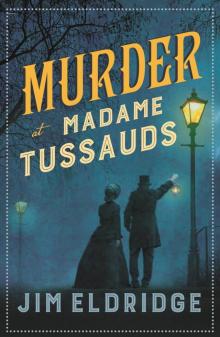 Murder at Madame Tussauds
Murder at Madame Tussauds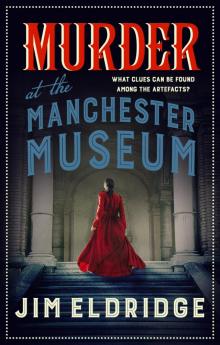 Murder at the Manchester Museum
Murder at the Manchester Museum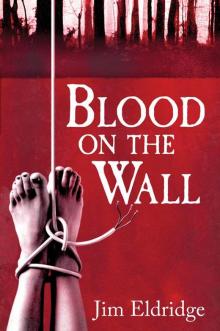 Blood On the Wall
Blood On the Wall 4.3.2.1
4.3.2.1 Jungle Kill (Black Ops)
Jungle Kill (Black Ops)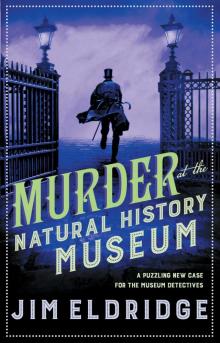 Murder at the Natural History Museum
Murder at the Natural History Museum Murder at the British Museum
Murder at the British Museum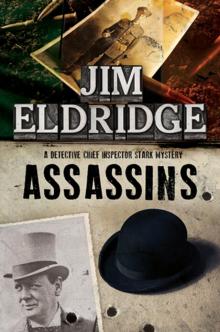 Assassins
Assassins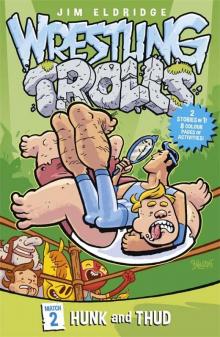 Hunk and Thud
Hunk and Thud Roman Invasion
Roman Invasion Big Rock and the Masked Avenger
Big Rock and the Masked Avenger The Last Enemy
The Last Enemy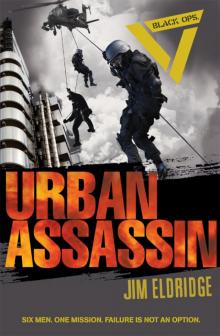 Urban Assassin
Urban Assassin The Deadly Game
The Deadly Game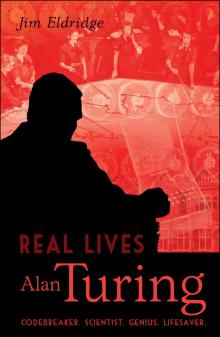 Alan Turing
Alan Turing The Lethal Target
The Lethal Target The Giant Rumble
The Giant Rumble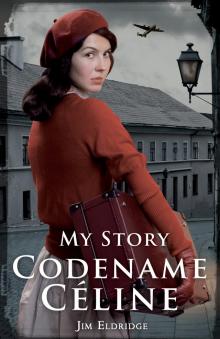 Codename Céline
Codename Céline Death in the Desert
Death in the Desert Escape from Pompeii
Escape from Pompeii The Invisible Assassin
The Invisible Assassin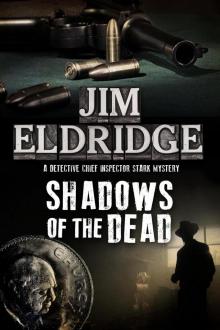 Shadows of the Dead
Shadows of the Dead Jack Versus Veto
Jack Versus Veto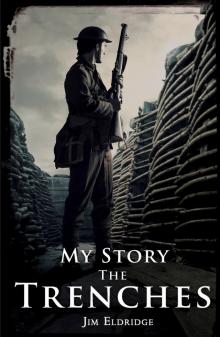 The Trenches
The Trenches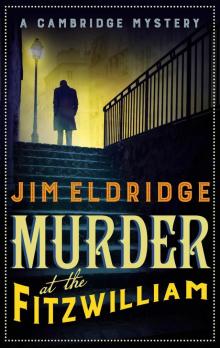 Murder at the Fitzwilliam
Murder at the Fitzwilliam Coming Home
Coming Home